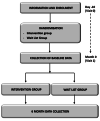Virtual clinic for young people with type 1 diabetes: a randomised wait-list controlled study
- PMID: 37990315
- PMCID: PMC10664359
- DOI: 10.1186/s12902-023-01516-x
Virtual clinic for young people with type 1 diabetes: a randomised wait-list controlled study
Abstract
Background: The transition from paediatric to adult care for young adults with type 1 diabetes poses unique challenges. Virtual diabetes clinics using smartphone applications offer a promising approach to support self-management and enhance communication with healthcare providers. The primary objective of this study was to evaluate the effects of a virtual diabetes clinic on glycaemic control, treatment satisfaction, and quality of life among young adults diagnosed with type 1.
Methods: 79 participants with type 1 diabetes aged 18-25 years were included in a prospective, single-centre, randomised, wait-list controlled trial. Participants were randomly assigned to either the intervention group or the wait-list control group. The intervention group received instant access to a virtual care platform called Vista Dialog, which facilitated real-time communication between patients and healthcare providers. Glycosylated haemoglobin (HbA1c) levels, time in range (TIR), time below range (TBR), diabetes treatment satisfaction, and quality of life were assessed at baseline and after 6 months.
Results: Baseline characteristics were similar between the intervention and control groups, except for education level, where there was a skewed distribution between the groups (the intervention group had a lower education level). At the 6-month follow-up, there were no significant differences in HbA1c levels, TIR, TBR, or diabetes treatment satisfaction between the two groups. However, the intervention group demonstrated a significant decrease in the burden on physical health compared with the control group, indicating an improved quality of life.
Conclusions: The implementation of a virtual diabetes clinic using the Vista Dialog platform did not result in significant improvements in glycaemic control or treatment satisfaction compared with usual care. However, it did show potential benefits in terms of reducing the burden on physical health and improving quality of life in young adults with type 1 diabetes. Further research is needed to explore the long-term effects and optimal use of virtual clinics in diabetes management.
Trial registration: ISRCTN number: 73,435,627 (registration date: 23/10/2019): https://doi.org/10.1186/ISRCTN73435627 . The performance and results of this trial adhere to the guidelines outlined in the CONSORT 2010 (Consolidated Standards of Reporting Trials) recommendations.
Keywords: Glycaemic control; Quality of life; Treatment satisfaction; Type 1 Diabetes; Virtual Diabetes clinic; Young adults.
© 2023. The Author(s).
Conflict of interest statement
We confirm that the authors have no competing interests as defined by BMC or any other interests that could potentially influence the results and/or discussion presented in this paper.
References
-
- Gutierrez-Colina AM, Corathers S, Beal S, Baugh H, Nause K, Kichler JC. Young adults with type 1 Diabetes preparing to transition to Adult Care: Psychosocial Functioning and associations with Self-Management and Health outcomes. Diabetes Spectrum: A Publication of the American Diabetes Association. 2020;33(3):255–63. doi: 10.2337/ds19-0050. - DOI - PMC - PubMed
Publication types
MeSH terms
Substances
LinkOut - more resources
Full Text Sources
Medical
Research Materials


